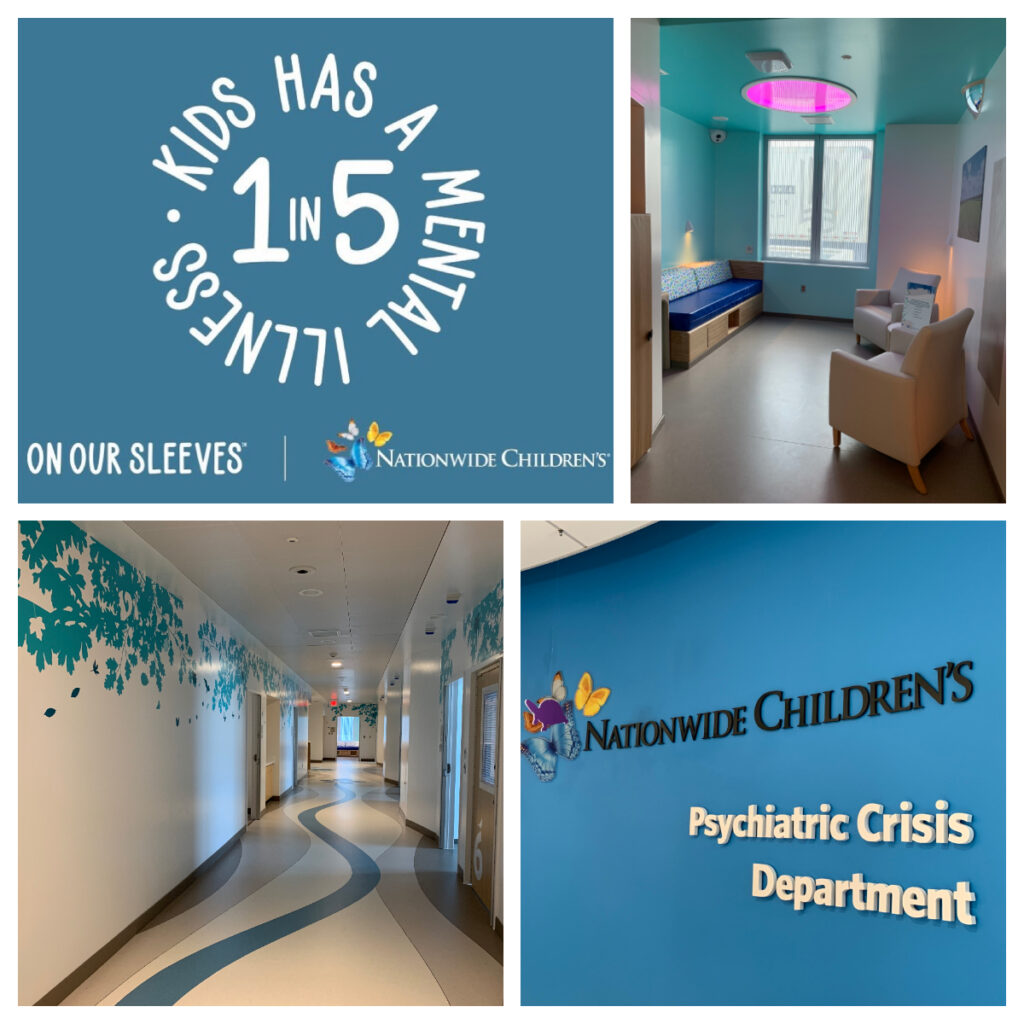
Last week, I was privileged to be part of an exclusive influencer summit for the grand opening of the Nationwide Children’s Hospital Big Lots Behavioral Health Pavilion.
I learned so much and am now even more passionate and committed to using this platform to promote positive mental health for children and everyone.
On Our Sleeves
For two years, Nationwide Children’s Hospital has spearheaded a movement to transform children’s mental health. The “On Our sleeves” campaign is about bringing children’s mental issues out into the open, since kids don’t wear their feelings on their sleeves. By eradicating the stigma, shame and silence around kids mental and behavioral health – and bringing the conversation about kids mental health into the light where it belongs – we can start to solve this problem.
The statistics are staggering: 1 in 5 kids lives with a significant mental illness, and half of all lifetime mental illnesses begin by age 14. Yet children’s mental health has historically been overlooked and under-resourced… until now.
The Big Lots corporation donated $50 million to build the new Behavioral Health Pavilion, which I got to tour and is utterly stunning. This was the largest donation to children’s mental health EVER, anywhere. It represents an unprecedented commitment by the Columbus community to put an end to the stigmas and silence around children’s mental health.
According to the experts at Nationwide Children’s Hospital, their goal is to not just better serve kids in Ohio, but to also develop a national model for pediatric mental health care and research.
The new Pavilion will expand clinical access for families, develop targeted prevention efforts and initiate research to better understand the causes and most effective treatment of behavioral health conditions. Learnings gained from the clinicians and scientists at Nationwide Children’s will be freely shared to improve care for children everywhere. These discoveries will ultimately fulfill our mission and the promise of On Our Sleeves to improve outcomes for children living with mental illness.
Mental health issues in childhood can range from more extreme cases like bipolar, schizophrenia and suicidal thoughts to situations such as anxiety, depression or trauma related to bullying or abuse.
While our group of bloggers and influencers toured this gorgeous new Behavioral Health Pavilion, I struggled with waves of sadness. It was tough for me to reconcile this lovely new space, an oasis of calm and comfort, with the fact that it is a modern mental hospital for kids. As beautiful as the place is, it’s heartbreaking to think about the families who will bring their kids there – and the kids who will need to stay there.
But thank goodness this facility exists, because obviously there’s a real need for it. Did you know that suicide is the second leading cause of death among 10 to 19 year olds? Youth suicide prevention and research is a huge focus area for the Big Lots Behavioral Health Pavilion team. And if anything can give these kids hope and help in their healing, surely this gorgeous new building dedicated to children’s behavioral health and wellness should be a huge step in the right direction.
The cornerstone of the new Behavioral Health Pavilion building is the Psychiatric Crisis Department, which is essentially an ER for kids experiencing a mental or behavioral health crisis. There, kids are evaluated and observed to determine if they need to be admitted to receive a higher level of care.
I hope that no child we know will never need to use the Psychiatric Crisis Department, but the stats say that it’s likely they will, and I am so glad that it exists. If our kids ever have an urgent behavioral health concern that needs immediate attention, this is a safe, comforting place purposefully designed, and with specially trained staff, to meet the needs of kids in crisis.
How will I know?
The biggest question I had during the influencer summit, where we got to meet with doctors and other experts from the Behavioral Health Pavilion, was how will I know as a parent if or when my child needs this place or these services?
The Children’s Hospital experts gave us several tips about what to look for in kids. Signs of mental health issues can be tough to spot, because many kids exhibit these symptoms! They urged us to trust our guts as parents and watch for significant changes in our kids, such as:
- Withdrawing
- Excessive risk-taking (where there was none before)
- Inattention or change in ability to concentrate (can be a sign of anxiety)
- Rapid changes or acute differences from normal behavior (e.g., appetite, sleeping habits)
- Irritability, anger or opposition (can be signs of depression in kids)
- Feelings of hopelessness, worthlessness
Additional tips on identifying mental health concerns in kids can be found on the On Our Sleeves site.
How can we help?
Another big question I had was how can parents help kids and stay close to them to help with behavioral health concerns when they first arise. The experts urged us to establish lines of communication with kids and keep them open. They recommended we stay on top of a healthy diet, exercise and sleep – three huge factors that can help anyone’s mental and physical health, regardless of age.
They encouraged us to let kids know that we are available and interested in talking with them; that we ask questions but not too many; and that we reach out and talk to teachers and others who interact with our child if we start to worry there may be a problem.
The doctors urged us never to say “it’s all in your head” when kids get stomaches or headaches caused by stress or worry. Anxiety, stress and depression can all manifest as very real physical maladies – but they are not “psychosomatic” and the pain is very real.
Another thing I learned is that when bullying situations arise, it is both the victim and the perpetrator who need help and additional mental health support. Statistics show that both the person who’s been bullied and the person who is bullying are at risk for future suicidal ideation and even attempts.
We were encouraged to guide kids to think about and see their successes and the positive impact they have on the lives and environment around them. Too often, kids and adults can think about our failures or shortcomings and forget to look at the good stuff.
Bottom line, we were empowered to realize that our attention is the most valuable tool we have as a parent and guardian of our children’s mental health. We were also directed to the Effective Child Therapy site, which is run by the Society of Clinical Child and Adolescent Psychology.
If you or your child needs immediate help due to having suicidal thoughts, please call the National Suicide Prevention Lifeline at 1-800-273-TALK (8255) or reach the Crisis Text Line by texting “START” to 741-741.
If you have thoughts or stories to share about kids mental and behavioral health, I’m always listening in the comments below and over on Facebook. It’s a tough topic to talk about, I know, but such an important one.




Comments
Comments are closed.